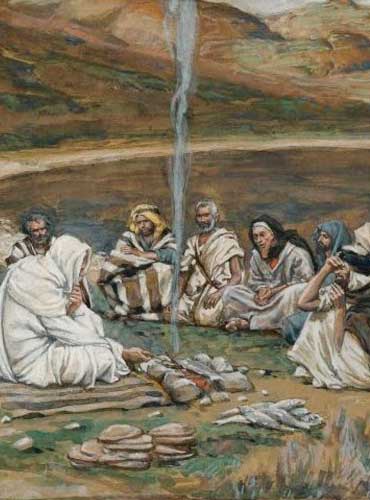Friday of the Octave of Easter – Jn 21:1-14
Today’s Gospel passage shows us how we must place Jesus at the center of our lives, and how, in His great mercy, Christ constantly seeks us out. At the beginning of today’s Gospel, we’re presented with the Apostles who, despite the other appearances of Jesus, continue in their disbelief. The result is almost comical, and we see this in two things that call our attention: first, Peter’s words, “I am going fishing,” and second, the apostles whom John points out. Regarding the first, Peter uses two very specific words; a more literal translation would be “I am going back to being a fisherman.” He makes it clear that he intends to return to his former way of life, as if he could simply walk away from and forget the past three years with Jesus, to cast into oblivion the miracles, the graces, the healings, but also his denials and his falling short. The evangelist shows further how confused the Apostles are by pointing out that with Peter are Thomas called Didymus and Nathanael from Cana in Galilee. Tradition holds that Thomas was an architect or at least a builder, and while no profession is recorded for Nathanael, and experts aren’t sure exactly where the town of Cana was located, all the possible locations place it miles from the sea. In other words, Thomas and Nathanael were two very unlikely candidates for a life of fishing, and yet John lists them first, as though they were the most eager to follow Peter.
These two points can also be seen in our lives. At times we can feel like we simply want to walk away, to forget the difficulties and, yes, our failings too. We might be convinced that the “grass is greener on the other side,” that it’s easier somewhere else. More often than not, though, it’s not that dramatic; we just want to let up in some part of our lives, to avoid giving everything to Jesus and to instead take some shortcut. Yet, no matter what we do, no matter how we try to get away from God, the memory of those graces, and His Mercy, remain. To try to do something other than love God entirely is, for the religious, like sending an architect out fishing: it doesn’t make sense, because it goes against who we are and what we’re called to be.
Fortunately for us, God is very merciful, and if we constantly turn to Him in prayer and the sacraments, He comes to find us. This is what He does in Peter’s case. Although the events recalled in the second part of the Gospel seem just like those of Lk 5:1-11, when Peter was first called, something is different; some words are missing. When told to lower the nets on the other side of the boat, Peter doesn’t give a reply; he simply obeys.
We have to understand for a moment how difficult and odd that first command from Jesus was for a fisherman. After all, Peter was a fisherman; he knew how to fish, and some strange figure on the shore couldn’t change what hundreds, if not thousands, of years of fishing experience had proven. There are at least three reasons why Peter shouldn’t have listened to Christ. First, Peter was the fisherman, and Christ a carpenter. Secondly, every fisherman knows the best time for fishing is at night, not during the day. Thirdly, throwing the net on the wrong side of the boat is to be set up for disaster if the nets get caught or tangled. Peter knows that the command is a strange one, and he obeys, albeit halfheartedly: in Luke’s account, in the Greek, Jesus asks Peter to lower the nets. Peter replies that he will lower a net, not several, but one. Jesus, though, takes what he’s given, and works with what He has. Perhaps recalling this, after the Resurrection, He only asks Peter to lower a single net, because that’s where his faith is at. The point is not that the dialogue is changed, but that Peter has changed. Jesus doesn’t let him walk away from his calling. Instead, Jesus waits, with His mercy, to encourage Peter in his calling. We see this beautifully in another particular detail: Jesus is waiting with a charcoal fire. The word for the fire in Greek is very specific, and it is found only in two places in the entire New Testament: here and in Jn 18:18, when Peter warms himself by the fire and denies Christ three times. Jesus brings that fire, not to condemn Peter for his failings, but to show His love for the prince of the Apostles in spite of them.
Today, we can ask ourselves about how we view our past failings and God’s mercy. Are we trying to go fishing, to get away from His mercy in some way, or are we willing to follow Him on the path to heaven? Today, let us pray, through the intercession of Mary, Mother of Our Risen Lord, for the grace to truly place Christ at the center of our lives, and to live our vocations with joy and trust.






